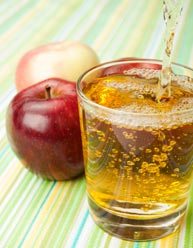
Many children enjoy drinking apple or grape juice and many parents see juice as a healthy alternative to soda and artificially flavored fruit punch.
New research, however, suggests these juices are not as innocent as we're led to believe. In fact, if a recent Consumer Reports investigation is correct, they could be slowly poisoning hundreds of thousands of children every day [1].
Apples and grapes, like many fruits, naturally contain trace amounts of arsenic, a notoriously well-known poison. The inorganic toxic form of arsenic investigators are concerned about with regard to fruit juice is normally used to make pesticides (and, historically, to poison kings, queens, and the like).
A Consumer Reports investigation into this potentially life-threatening issue found that upwards of 10 percent of the U.S. apple juice supply may contain higher concentrations of inorganic arsenic than federal law mandates. Altogether, 88 samples of apple and grape juice were gathered from the greater New York, New Jersey, and Connecticut metropolitan areas. Each sample was tested by an independent research facility contracted by the magazine.
Federal guidelines currently state arsenic levels in these types of juices should not exceed 10 parts per billion (PPB). Arsenic levels detected in apple juice ranged from 1.1 PPB to a staggering 13.9 PPB. Grape juice measurements were significantly worse, ranging from 5.9 to 24.7 PPB.
Clearly, we cannot allow such high levels of arsenic to continue tainting our children's juice supply, but it’s likely that adopting an industry-wide resolution will be slow coming. In the meantime, the safest solution is to opt for a glass of purified water instead of sugary fruit juice.
I always recommend children and adults perform a chemical and heavy metal cleanse at least 3x per year to eliminate these toxic compounds from the body.
References (1)
- Andrea Rock. Consumer reports tests juices for arsenic and lead. Consumer News. 30 November 2011.
†Results may vary. Information and statements made are for education purposes and are not intended to replace the advice of your doctor. If you have a severe medical condition or health concern, see your physician.







